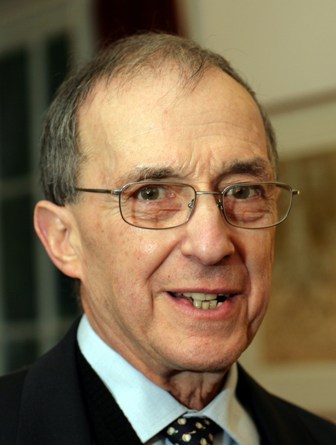 The College is very sad to announce that our Fellow, Professor Sir Peter Lachmann, died on Saturday 26th December 2020. Although he had been frail for some time, he enjoyed celebrating his 89th birthday with his family on Wednesday 23rd December and fully participated in the family Christmas, then died peacefully in his sleep.
The College is very sad to announce that our Fellow, Professor Sir Peter Lachmann, died on Saturday 26th December 2020. Although he had been frail for some time, he enjoyed celebrating his 89th birthday with his family on Wednesday 23rd December and fully participated in the family Christmas, then died peacefully in his sleep.
All in College send Sylvia and the children their deepest sympathy at the loss of a remarkable man. Peter was immensely proud of their children: Robin - a consultant in metabolic diseases; Helen, Professor of Renal Medicine (both at UCL); and Michael - a distinguished producer of science documentaries for the BBC.
Peter was first admitted to the Fellowship in 1962 as a Junior Research Fellow. In 1972 he left the Fellowship to go to Hammersmith Hospital, returning to be readmitted to the Fellowship at Christ’s in 1976, having been elected the Sheila Joan Smith Professor of Immunology. Since then he has been extremely generous to the College in many ways, unflinchingly giving his time and support to the Fellowship and College, and serving in many roles, most recently as 'Keeper of the Bees'.
Peter was never one to shy away from controversial issues, always vocal in his support (or not) of many things! He had an extraordinary career and the College is extremely proud of the part it has played in his life and is most grateful for his enormous contribution.
Born in Berlin in 1931, Peter moved to London in 1938. He trained in medicine at Cambridge and University College Hospital graduating in 1956 and obtained a PhD (1962) and ScD (1974) in Cambridge in immunology.
He served as President of the Royal College of Pathologists, Vice President and Biological Secretary of the Royal Society, and Founder President of the UK's Academy of Medical Sciences among many other positions.
Peter’s posts specifically in immunology have included Head and Honorary Head of the Medical Research Council Group on Mechanisms in Tumour Immunity and Honorary Director of the MRC Mechanisms in Tumour Immunity Unit. From 1976 to 1999 he was Honorary Clinical Immunologist with the Cambridge Health Authority.
Peter also won numerous international accolades including a Gold Medal from the European Complement Network in 1997. His primary research interest most recently has been the downregulation of the complement alternative pathway as a treatment for age related macular degeneration. He previously worked on many aspects of complement biology; on microbial subversion of the innate immune response; on the immunology of measles, on systemic lupus erythematosus and on insect sting allergies. Peter was knighted for service to medical science in 2002.
Peter helped produce the Royal Society's first report on GM crops in 1998. The report, Genetically Modified Plants for Food Use, outlined the benefits of GM plants in agriculture, medicine, food quality and safety, nutrition and health, especially in alleviating food shortage in third-world countries. He remained a vocal proponent of the defence of reason and scepticism in scientific academia, as well as on other topics that extend from vaccine scares to stem cell technology and to alternative medicine.
Peter was also a bee keeper and this interest led to an interest in the evolution of group behaviour in both bees and humans. In 2019 he published a provocative monograph 'Why Mankind Has Needed Religion Whereas Bees Have Not' with a Foreword by Rowan Williams, arguing that religious prescriptions provide the building blocks for the cultural evolution of distinct human moral communities. He was a member of the Norwegian Academy of Science and Letters, Foreign Fellow of the Indian National Science Academy (1997) and Honorary Foreign Member Czech Academy of Medicine (2012).
